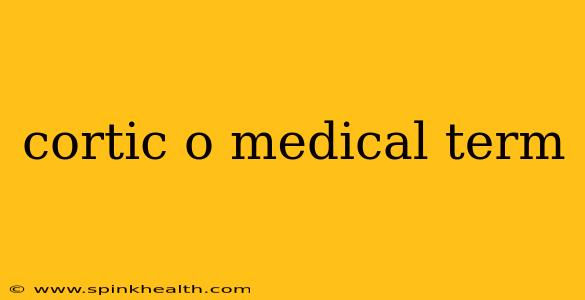The term "cortic-" might sound intimidating, conjuring images of complex medical jargon. But fear not! This seemingly cryptic prefix holds a fascinating story, unlocking the secrets of a crucial part of our anatomy and physiology. Let's unravel the meaning of "cortic-" and explore its significance in the world of medicine.
Our journey begins with the Latin word "cortex," meaning "bark" or "rind." In the medical context, "cortic-" refers to the outer layer or shell of an organ or structure. Think of an orange: the juicy segments are the inside, while the protective outer layer is the cortex. This anatomical analogy perfectly captures the essence of the term.
What Body Parts Use the Prefix "Cortic-"?
The "cortic-" prefix isn't limited to a single organ; its versatility extends across various anatomical locations. This makes understanding its applications crucial for grasping medical terminology.
1. The Cerebral Cortex: The Seat of Higher Cognition
Perhaps the most well-known use of "cortic-" is in the term "cerebral cortex." This outermost layer of the cerebrum—the largest part of the brain—is responsible for higher-level cognitive functions like language, memory, and decision-making. Imagine it as the brain's command center, directing thoughts, actions, and emotions. Damage to the cerebral cortex can lead to a wide range of neurological deficits.
2. The Adrenal Cortex: Hormonal Harmony
Another key player is the adrenal cortex, the outer region of the adrenal glands located atop the kidneys. This vital structure produces crucial hormones such as cortisol, aldosterone, and androgens, all playing essential roles in regulating metabolism, blood pressure, and stress response. Imbalances in adrenal cortex function can result in conditions like Cushing's syndrome or Addison's disease.
3. Other Cortical Structures
While the cerebral and adrenal cortices are the most prominent, the "cortic-" prefix also appears in other anatomical contexts. For example, you might encounter terms related to the renal cortex (the outer layer of the kidney), the ovarian cortex (the outer layer of the ovary), or even the thymus cortex (part of the thymus gland).
Frequently Asked Questions about Cortic-
Here are some common questions people have about the "cortic-" prefix in medical terms, answered in detail:
What does cortic mean in medical terms?
In medical terminology, "cortic-" refers to the outer layer or cortex of an organ or structure. It stems from the Latin word "cortex," meaning "bark" or "rind," highlighting the anatomical position of the structure it describes.
What is the difference between the cortex and medulla?
This is an excellent question that highlights the contrast with another common anatomical term, "medulla." While "cortic-" refers to the outer layer, "medulla" refers to the inner part or core of an organ. Think of it as the opposite of the cortex. For example, the adrenal gland has both a cortex and a medulla, each producing different hormones and carrying out distinct functions.
What are some medical conditions related to the cortex?
Numerous medical conditions are associated with cortical dysfunction. These can range from relatively minor issues to severe and life-threatening diseases depending on the specific organ involved. Conditions affecting the cerebral cortex can include stroke, traumatic brain injury, epilepsy, and Alzheimer's disease. In the case of the adrenal cortex, disorders like Cushing's syndrome and Addison's disease can arise from hormonal imbalances.
How does the cortex function?
The function of a specific cortex depends on its location within the body. The cerebral cortex is responsible for higher-order cognitive functions, whereas the adrenal cortex produces hormones essential for metabolism and stress response. The renal cortex filters blood and plays a vital role in urine production. Each cortical region has its own specialized function.
Understanding the "cortic-" prefix offers a glimpse into the intricacies of human anatomy and physiology. It's a valuable tool for deciphering medical terminology and appreciating the complexity of the body's systems. As we've explored, it's not just a word; it's a key to unlocking a deeper understanding of how the body works.

